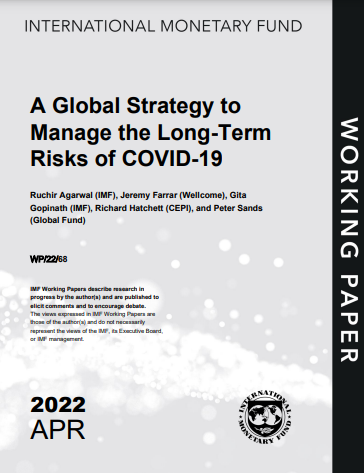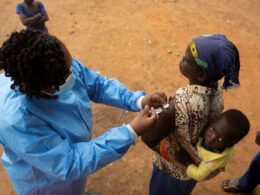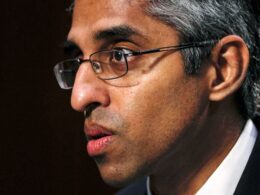Without an adequate response, COVID-19 would “continue to reverberate and disrupt the whole of societies for many, many years to come .
International Monetary Fund (IMF)
Ruchir Agarwal (IMF), Jeremy Farrar (Wellcome), Gita Gopinath (IMF), Richard Hatchett (CEPI), and Peter Sands (Global Fund)
April 4, 2022
Abstract
The pandemic is not over, and the health and economic losses continue to grow.
- It is now evident that COVID-19 will be with us for the long term, and there are very different scenarios for how it could evolve, from a mild endemic scenario to a dangerous variant scenario.
This realization calls for a new strategy that manages both the uncertainty and the long-term risks of COVID-19. There are four key policy implications of such as strategy.
- First, we need to achieve equitable access beyond vaccines to encompass a comprehensive toolkit.
- Second, we must monitor the evolving virus and dynamically upgrade the toolkit.
- Third, we must transition from the acute response to a sustainable strategy toward COVID-19, balanced and integrated with other health and social priorities.
- Fourth, we need a unified risk-mitigation approach to future infectious disease threats beyond COVID-19.
Infectious diseases with pandemic potential are a threat to global economic and health security.
First, we need to achieve equitable access beyond vaccines to encompass a comprehensive toolkit.
The international community should recognize that its pandemic financing addresses a systemic risk to the global economy, not just the development need of a particular country.
- Accordingly, it should allocate additional funding to fight pandemics and strengthen health systems both domestically and overseas.
- This will require about $15 billion in grants this year and $10 billion annually after that.
The international community should … allocate additional funding to fight pandemics and strengthen health systems both domestically and overseas. This will require about $15 billion in grants this year and $10 billion annually after that.

Deploying a comprehensive toolkit—including the new antivirals—will provide multiple lines of defense, reducing the risk of hospitalization, economic disruptions, and a fear-driven response every time cases surge or a new variant emerges.
Many of the capacities required for a more comprehensive approach—oxygen, PPE, enhanced diagnostic capacity, and so on—will be of value not just for COVID-19 but also for many other
health risks and diseases. On vaccinations, the focus should primarily be on fully vaccinating the most clinically vulnerable populations (in accordance with WHO’s Prioritization roadmap, WHO 2022a)
IMF Working Papers describe research in progress by the author(s) and are published to elicit comments and to encourage debate. The views expressed in IMF Working Papers are those of the author(s) and do not necessarily represent the views of the IMF, its Executive Board, or IMF management. 2022
Originally published at /sites/reliefweb.int/files/resources/EN_107.pdf
Case study: London
Excerpted from https://healthpolicy-watch.news
One in 12 Londoners have COVID
Wellcome Trust director Jeremy Farrar said that one in 12 people in London were infected with COVID-19, and the pandemic was clearly far from over.
“We have many parts of the world without access to vaccines, and we have many parts of the world where transmission remains very, very high.
That throws up the possibility of new variants that will escape our current vaccination and current immunity,” said Farrar.
“The actions that we take now, the reforms that we put in place, the financial support we give, will enable a pandemic and its acute phase to come to an end quicker and allow all our societies, all of our economies to get back on track faster,” he added, warning that without an adequate response, COVID-19 would “continue to reverberate and disrupt the whole of societies for many, many years to come”.
Farrar said that the “last thing” that should happen is for vaccine manufacturing capacity to be scaled down.
without an adequate response, COVID-19 would “continue to reverberate and disrupt the whole of societies for many, many years to come .












